Vienna public transport operator Wiener Linien is testing an energy saving tram, the EcoTram, using it in daily operation until May 2014. The tram is part of a bigger project to make public transport vehicles more energy efficient.
A Siemens ultra low floor tram has been equipped with intelligent control units that predict whether cooling or heating will be required. If the tram enters a tunnel where the ambient temperature is cooler, the air-conditioning will be turned down. The units control three air
August 21, 2013
Read time: 2 mins

Vienna public transport operator 4203 Wiener Linien is testing an energy saving tram, the EcoTram, using it in daily operation until May 2014. The tram is part of a bigger project to make public transport vehicles more energy efficient.
A189 Siemens ultra low floor tram has been equipped with intelligent control units that predict whether cooling or heating will be required. If the tram enters a tunnel where the ambient temperature is cooler, the air-conditioning will be turned down. The units control three air-conditioning units with heat pumps, a variable-frequency compressor and CO2 sensors. According to Siemens, the tram could offer annual savings of up to 3,000 MWh for tram operator Wiener Linien.
The EcoTram project has been running since 2009, supported by the Climate and Energy Fund of the Austrian Research Promotion Agency as part of its New Energies 2020 programme.
Other project partners include the Automation and Control Institute at Technische Universität Wien, which has developed the control software; Rail Tec Arsenal, which has manufactured the measuring technology; and Vossloh Kiepe, which has supplied the heating and air-conditioning units. Consulting firm SCHIG mbH is the project manager.
A
The EcoTram project has been running since 2009, supported by the Climate and Energy Fund of the Austrian Research Promotion Agency as part of its New Energies 2020 programme.
Other project partners include the Automation and Control Institute at Technische Universität Wien, which has developed the control software; Rail Tec Arsenal, which has manufactured the measuring technology; and Vossloh Kiepe, which has supplied the heating and air-conditioning units. Consulting firm SCHIG mbH is the project manager.










